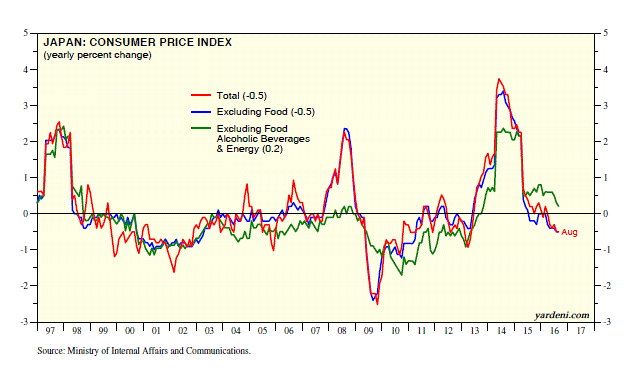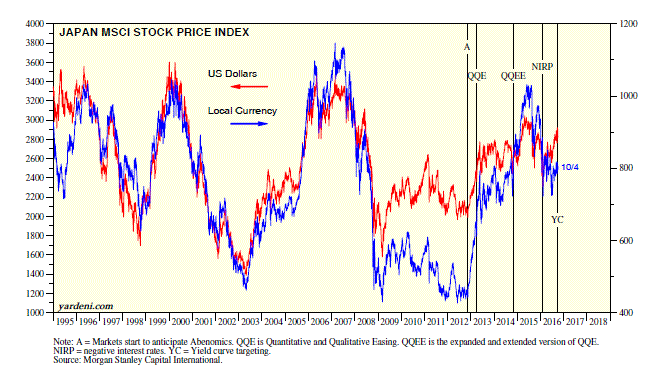For many years, there has been a recurring pattern of banks getting into all sorts of trouble. That’s because bankers are playing with other people’s money (OPM). They either have no—or very little—skin in the game. So they have a tendency to take more risk than they should. Just like power, OPM can corrupt some people. I don’t have any reason to believe that any of the major central bankers is corrupt, but their access to and excess with the OPM they control is a drug, i.e., it’s their opium.
When they were first established, central banks were tasked with providing an elastic currency that met the seasonal ebbs and flows of money demand. They were also supposed to provide liquidity when financial crises occurred from time to time to make sure they didn’t turn into full-blown financial contagions. They certainly were not mandated to manage the economy with the aim of keeping the labor market near full employment and stabilizing inflation around a fixed and near-zero target. Most of them originally were run by commercial bankers and lawyers who tended to be conservative and weren’t trained to manage the economy in any case.
That changed in recent years, and now the major central banks have been overrun by macroeconomists in the policy committees, with large staffs of more macroeconomists. They’ve all been trained to manage an economy, and firmly believe that’s their job and they can do it. The leading proponent of that view in the United States is, of course, the leader of the Fed, namely Fed Chair Janet Yellen.
Central bank leaders are convinced that without their ongoing and expanding ultra-easy monetary policies—relying increasingly on so-called “unconventional” monetary tools—the global economy would have sunk into a depression following the financial crisis of 2008. Of course, they’ve been disappointed that the pace of economic growth has been sub-par and that inflation remains below their 2% targets. However, they argue the counterfactual—namely, that were it not for the forward guidance, quantitative easing, and negative interest rates they implemented once their official interest rates had fallen to zero (the dreaded “lower bound”), there would have been a terrible outcome. They never consider the alternative counterfactual that their unconventional policies might be one of the main causes of global secular stagnation.
Last Thursday, in a video conference (start listening at the 9:05 time mark) with bankers in Kansas City, Yellen crossed the line, in my opinion, when she suggested that the Fed should be authorized by Congress to buy corporate bonds and stocks. After all, she noted, the Bank of Japan (BOJ) has been buying corporate bonds and stocks for a while, and the ECB has been buying corporate bonds since June of this year. That’s true, but how’s that working so far?
Not so good. The BOJ just can’t seem to stop the forces of deflation. In August, Japan’s CPI was down 0.5% y/y, while the “core core” rate was up only 0.2%. Japanese industrial production rose 1.5% m/m during August, but is actually down 5.1% from January 2014, despite Abenomics. In the Eurozone, the headline CPI inflation rate was only 0.4% during September, according to the flash estimate, while the core rate was 0.8%. Eurozone industrial production fell 1.1% m/m in July, and was down 0.5% y/y, the weakest since November 2014. On the other hand, Germany’s Ifo Business Confidence Index rose smartly during September, though the survey was taken before Deutsche Bank (NYSE:DB) hit the fan. European banks are sitting on too many nonperforming loans, which is weighing on their willingness to lend, notwithstanding all the efforts by the ECB to encourage them to do so.
Yellen graduated from Yale with a Ph.D. five years before I did the same, in 1976. We both learned from Professor James Tobin, the chairman of both our dissertation committees, about the “Portfolio-Balance Model.” The idea is that assets are substitutable for each other. So if the Fed buys government bonds, reducing their supply, that will drive more demand into other bonds as well as equities. The resulting increase in wealth then should stimulate spending. (My Ph.D. dissertation was titled “A Portfolio-Balance Model of Corporate Finance.”)
In her talk last Thursday, Yellen said:
Now because Treasury securities and, say, corporate securities and equities are substitutes in the portfolios of the public, when we push down yields--let’s say on Treasuries--there’s often and typically spillover to corporate bonds and to equities as well [such] that those rates fall or that equity prices rise, stimulating investment. But we are restricted from investing in that wider range of assets. And if we found--I think as other countries did--that [we] had reached the limits in terms of purchasing safe assets like longer-term government bonds, it could be useful to be able to intervene directly in assets where the prices have a more direct link to spending decisions.
Got that? If the Fed runs out of Treasuries, “it could be useful” to buy corporate bonds and stocks. Spoken like a true central monetary planner. She would like to add that option to the Fed’s toolkit just in case the other tools used to tinker with the economy don’t work. She is very blunt about her willingness to distort our capital markets because they clearly aren’t working well enough on their own to achieve the Fed’s goals.
How can capitalism survive in the US if the capital markets are completely distorted by the Fed? The economy certainly doesn’t seem to be getting any lift from all the distortions that have occurred in the Treasury bond and money markets caused by the Fed’s policies since the financial crisis of 2008. Intervening so broadly in the capital markets is bound to disrupt the process of creative-destruction that is integral to capitalism. It will keep zombie companies in business, which would be deflationary and reduce profitability for well-run competitors. Investors won’t get to determine the winners and losers if the Fed buys simply to prop up stock prices. Depending on the circumstances, the “Yellen put” might result in a speculative bubble.
In short, it’s an insane idea. But the BOJ and the ECB are doing it, so why can’t we do it too? Could it be that they are insane? They certainly aren’t doing anything to revive capitalism’s animal spirits. Both the Eurozone and Japan have relatively inferior capital markets compared to the vibrant ones in the US. That’s one of the main reasons why the US economy is outperforming them. They still depend too much on their banks for financial intermediation. Their banks have been broken for a long time, and the flat-yield curve and negative interest-rate policies of the BOJ and ECB certainly aren’t helping their banks.
Yellen concluded her response saying:
But while it’s a good thing to think about, it’s not something that is a pressing issue now, and I should emphasize that while there could be benefits to, say, the ability to buy either equities or corporate bonds, there would also be costs as well that would have to be carefully considered in deciding if it’s a good idea.
I think it would be a very bad idea.
On Friday of last week, just by coincidence (or maybe not), Larry Summers floated exactly the same idea. The 9/30 Bloomberg reported:
Among the proposals that deserve “serious reflection" is the purchase of a “wider range of assets on a sustained and continuing basis,” Summers said in a lecture at a Bank of Japan conference in Tokyo Friday. “I’m not prepared to make a policy recommendation at this point,” he told reporters later. ...
Japan has “engaged in that type of transaction to much greater extent than other countries,” Summers said, pointing out among its initiatives the BOJ’s purchases of exchange-traded funds. “It is something that economic logic suggests should be considered in other places where the zero lower bound is a potentially important monetary policy issue,” he said, referring to the perceived lower limit for benchmark rates set by central banks.
Got that? It’s “economic logic.” Maybe so, but that too certainly hasn’t worked for Japan so far. The BOJ started buying ETFs during October 2010 at a modest rate of roughly 450 billion yen per year. That was doubled to an annual 1 trillion yen in April 2013 and increased again to 3.3 trillion in October 2014. The BOJ’s Monetary Policy Committee literally doubled down at its July 28-29, 2016 meeting, raising the ante to 6 trillion yen. BOJ purchases are averaging 2.9% of daily trading values now.
The MSCI Japan JPY stock price index (in local currency) entered a bear market in mid-January and remains 22.6% below last year’s high. The stock market isn’t getting a lift from the government’s stock purchases because the yen has appreciated 24% since last year’s low. If the stock market is falling despite the BOJ’s faster pace of purchasing ETFs, what’s the point?
Summers acknowledged, “There are obviously important political and economic questions associated with government ownership of companies.” He said, “Some critics could term such a policy as ‘socialism.’” Sign me up for that club of critics! It’s certainly not capitalism, which would be gravely damaged in the US, as it has been in both Japan and the Eurozone by the half-baked interventions of the BOJ and ECB in the capital markets.
Interestingly, “What Assets Should the Federal Reserve Buy?” was the title of an article by two economists at the Federal Reserve Bank of Richmond, which first appeared in the bank’s 2000 annual report. (Hat-tip to Mike O’Rourke.) Back then, there was serious concern that the US Treasury would be running large budget surpluses and would pay off all of the outstanding federal debt in a matter of a few years. (Hard to believe, but true.) The authors didn’t specifically mention equities, but they strongly warned against the Fed buying private-sector securities for numerous good and obvious reasons. Summers and Yellen should read the article. Here is just one relevant excerpt:
There would be costs associated with assessing asset value and creditworthiness, whether the Federal Reserve hired staff to make those judgments internally or hired independent portfolio management. Further, the extension of even a small amount of Federal Reserve credit to a particular entity might be interpreted as conferring a preferential status enhancing that entity’s creditworthiness. The status of a particular asset or loan could deteriorate while in the Fed’s portfolio, requiring it to be sold, or not rolled over, in order to avoid taxpayer losses. It might be difficult, however, for political or bank supervisory reasons, for the Fed to sell such an asset or call such a loan.


